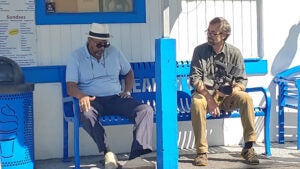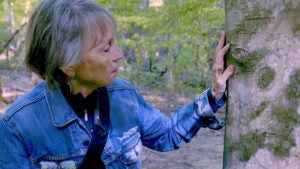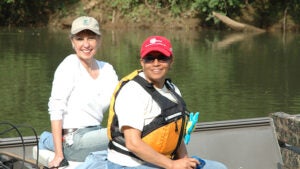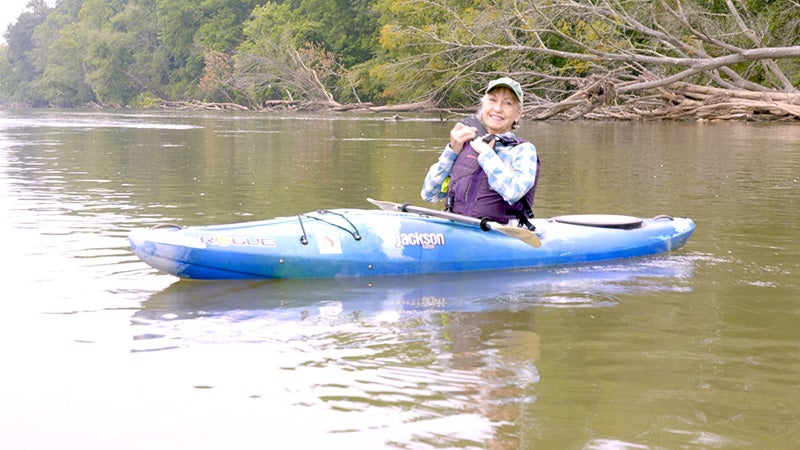‘Model of change’: Local film showcases generations of Chattahoochee River activism
Published 10:30 am Saturday, March 2, 2024
|
Getting your Trinity Audio player ready...
|
When watching the film “Saving the Chattahoochee,” you can’t help but feel that the river is a living part of the community. A crowd met at West Point Lake in early February to attend the screening of a film about the river that has flowed through their community, giving life to the lake for decades and generations.
The film follows three generations of women leaders acting to make a difference in the environmental community, all threaded together by the founding member of Chattahoochee Riverkeeper, Sally Bethea.
For filmmaker Hal Jacobs, from Decatur, the project was a labor of love in honor of his son Henry Jacobs, who has worked as a Riverkeeper since college. After 10 years, Henry is now the deputy director of the Chattahoochee Riverkeeper.
Over the years, they enjoyed time on the water, sailing or paddling together.
“I think we began to appreciate how much cleaner it was than what we had heard about in the past and how the Riverkeeper was doing so much for water monitoring all the local streams and just kind of raising awareness,” Hal said.
The family as a whole has always had a love for the outdoors and enjoyed spending time on the water. The father and son also began their film company, HJacobs Creative, to collaborate on projects like, “Saving the Chattahoochee” together.

“Over the last 10 years, he and I have been also documenting a lot of the river and our paddle trips,” Hal said. “So a lot of that footage made its way into the film.”
Bethea, as the founding Riverkeeper, was Henry’s first boss. Jacobs said they both wanted to feature her in the film for all her work over the years. They always try to focus on strong, philanthropic figures in their films.
“She’s one of these amazing, energetic, persistent, hard-driving people,” Jacobs said. “So it was kind of a given that we were going to feature her.”
Before Bethea got involved with the river, the Junior League of Atlanta formed the Friends of the River. A group of women from Atlanta in the 1970s, headed by Kay McKenzie, began lobbying for better treatment for the river, which had begun to show signs of soil erosion, industrial waste and sewer overflows from development in the major city.
“One of the reasons why [Bethea] finally agreed was that we thought we would feature other women as well as her, and I started seeing this connection with other women who pretty much saved the river from the northern suburbs of Atlanta through West Point,” Jacobs said.

The Friends of the River helped lobby for the Metropolitan River Protection Act. In 1978, they also supported a bill to create the Chattahoochee River National Recreation Area, which protected four 8-mile segments of the river and its riverbanks.
But later, there still hadn’t been a lot of work to preserve the river south of Atlanta. In the 1990s, Bethea helped found the Riverkeeper. The U.S. Waterkeepers fought pollution by suing polluters and educating the public.
Bethea became a figurehead and rallying point for the effort to save the Chattahoochee. She got people out on the river and appealed to them with facts.
In the next decade, Atlanta’s first Black female mayor, Shirley Franklin, made history as the “Sewer Mayor” for her efforts to bring the city’s dated sewer system into the 21st century. Much of the overflow from the sewers was going straight into the Chattahoochee River, which flows all the way downtown West Point Lake and beyond. Her “Clean Water Atlanta” initiative became an $8 billion project.

Bethea and Franklin worked together to help change minds and protect the river from further pollution.
“[The film] shows the different leadership styles of women across three generations, which I found very fascinating,” Jacobs said. “ … Sally and Shirley were the first generation of women who could be more active in politics.”
Together, three generations of women helped save a life-giving river that still flows through the West Point community today.
“The Chattahoochee is just one model of change that could apply to rivers everywhere,” Jacobs said. “The fact that it takes that level of deep involvement, and it takes a leader to step up and sort of rally people around her like Sally Bethea did.”
The next screening of “Saving the Chattahoochee” will be at the Columbus Public Library on April 16.





